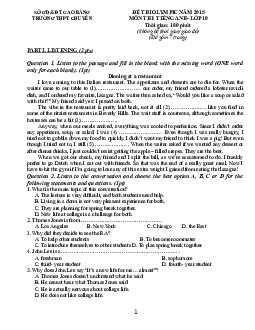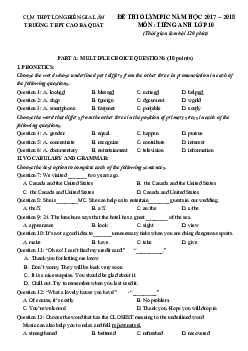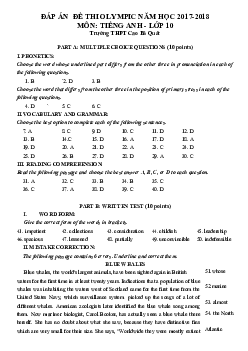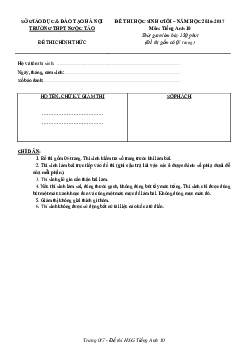









Preview text:
SỞ GD&ĐT HẢI DƯƠNG
KỲ THI NĂNG KHIẾU LẦN 2 TRƯỜNG THPT CHUYÊN NĂM HỌC 2021 - 2022 NGUYỄN TRÃI
MÔN: TIẾNG ANH KHỐI 10 CHUYÊN ĐỀ
Thời gian làm bài: 180 phút (không kể thời gian giao đề) ĐỀ CHÍNH THỨC
(Đề thi có 10 trang)
Ngày thi: 08 tháng 11 năm 2021
Full name: ___________________________________________
PART 1: LISTENING (50 points)
You will hear each recording twice.
I. Listen to the recording and do the following tasks. (20 points) Questions 1 – 3
Answer the following questions using NO MORE THAN THREE WORDS AND/OR NUMBERS for each answer.
1. How long will the customer’s course last? _____________________________
2. Which course has the customer already taken at the school? _____________________________
3. How much discount can returning students qualify for? _____________________________ Questions 4 – 6
Complete the following sentences using NO MORE THAN THREE WORDS AND/OR NUMBERS for each gap.
4. The customer’s address is _____________________________.
5. The customer can contact his former teacher by _____________________________.
6. There are _____________________________ hours of classes each day, Monday to Friday. Questions 7 – 10
Answer the following questions using NO MORE THAN THREE WORDS for each answer.
7. What is the customer’s impression of the female Arabic teacher?
_____________________________________________________
8. What other languages can the customer speak?
_____________________________________________________
9. What does the customer decide is the third factor in choosing a school?
_____________________________________________________
10. What does the customer say the reception area should be like?
_____________________________________________________ Your answers: 1. 2. 3. 4. 5. 6. 7. 8. 9. 10.
II. You are going to listen to someone being interviewed about a famous radio programme
broadcast in the USA. Listen and choose the best answer. (10 points)
1. The broadcast by Orson Welles was _____________.
A. based on a book by Rachel Watson.
B. based on a book by an English novelist. C. an original piece of work.
2. In the story ________________.
A. aliens come to Earth from Mars.
B. enormous fighting machines travel from Mars.
C. the people of London build machines to defend themselves. 1
3. Why does Rachel think that many listeners believed the news reports?
A. The actions were set in places they knew.
B. The programme makers didn’t warn listeners that the reports weren’t real.
C. Listeners didn’t notice the warnings.
4. Why were people worried about gas?
A. They believed the Martians were using it to attack people.
B. Some people fled their homes and left the gas on.
C. It was impossible to smell it.
5. What did the radio station promise to do?
A. Warn listeners properly next time.
B. Never use fake news reports again.
C. Stop making drama programmes.
III. You will hear a man called Alec Gardiner talking about the things he collects. Listen and
complete the sentences. Write NO MORE THAN THREE WORDS taken from the recording for
each answer in the spaces provided. (20 points)
Alec isn’t exactly (1) ___________________________ why he collects things. He started
collecting when he was (2) _________________________. As a child Alec kept the things he collected in
(3) __________________________.
Alec says it’s a wonderful feeling when he completes a (4) ______________________________
of something. Alec likes collecting cartoon figures because they look (5) __________________________
and they amuse him. It’s possible to collect so many Mickey Mouse figures because Mickey is the (6)
_____________________ cartoon character. He keeps most of his cartoon figures in the living room on
small (7) _______________________. Alec used to buy things at collectors’ (8) ____________________ and antique shops.
Alec doesn’t like to leave the house for too long because he’s afraid of (9) __________________.
In order to complete a set of something, Alec sometimes has to pay out (10) _____________________ hundred pounds. Your answers: 1. 2. 3. 4. 5. 6. 7. 8. 9. 10. 2 SỞ GD&ĐT HẢI DƯƠNG
KỲ THI NĂNG KHIẾU LẦN 2 TRƯỜNG THPT CHUYÊN NĂM HỌC 2021 - 2022 NGUYỄN TRÃI
MÔN: TIẾNG ANH KHỐI 10 CHUYÊN ĐỀ
Thời gian làm bài: 180 phút (không kể thời gian giao đề) ĐỀ CHÍNH THỨC
(Đề thi có 10 trang)
Ngày thi: 08 tháng 11 năm 2021
PART 2 – GRAMMAR – VOCABULARY – LANGUAGE FUNCTIONS (50 points)
I. Choose the best answer. (20 points)
1. One condition of this job is that you must be ___________ to work at weekends. A. available B. capable C. acceptable D. accessible
2. I’ve never really enjoyed going to the ballet or the opera; they’re not really my______. A. biscuit B. cup of tea C. sweets and candy D. piece of cake
3. The prison was so well guarded that any thought of escape was ___________. A. despairing B. aimless C. desperate D. pointless
4. Supposing I ___________ to agree to your request, how do you think the other students would feel? A. would B. am C. were D. could
5. I hope you won't take ___________ if I tell you the truth. A. annoyance B. offence C. resentment D. irritation
6. His failure ___________ great disappointment to his parents. A. forced B. made C. caused D. provided
7. The government's new safety pamphlet ___________ against smoking in bed. A. declares B. advises C. emphasises D. maintains 8. The management has its promise. A. gone back on
B. gone through with C. got away with D. got down on
9. Two months is ___________ time to allow for the job to be completed. A. profuse B. protracted C. ample D. extensive
10. Don't jump ___________ conclusions; we don't yet know all the relevant facts. A. into B. up C. to D. for
11. How do you ___________ about the pollution problem in this country? A. feel B. think C. believe D. view
12. The Health Minister was _______ in a private hospital last week. A. operated B. admitted C. cared D. treated
13. During our stay in Venice, we bought a ________ bottle. A. lovely perfume glass B. lovely glass perfume C. glass perfume lovely D. glass lovely perfume
14. On leaving prison, Tom decided to turn over a new ___________ and to give up his old life of crime. A. leaf B. page C. chapter D. book
15. I find that my work ________ so much of my time that I don’t have any free time. A. takes over B. takes up C. takes off D. takes after
16. Why did Mary ask you ____________ a bicycle? A. that if you had B. do you have C. that you had D. if you had
17. Her guest apologized for causing her so much ____________. A. problem B. complication C. trouble D. damage
18. The unscrupulous salesman _______ the old couple out of their life savings. A. deprived B. swindled C. robbed D. extracted
19. Can you ________ the BBC World Service on your new radio? A. put on B. take in C. get at D. pick up 3
20. Tax ________ deprives the state of several million pounds a year. A. retention B. dissertation C. escapism D. evasion
II. Complete each of the following sentences with a suitable particle (10 points)
1. Cauliflower isn’t my favorite vegetable. In fact, I don’t care ________ it at all.
2. “I’m depressed. I didn’t do very well on the first quiz.”
“Cheer ________! That quiz only counted for 10 percent of the total grade, and I’m sure you’ll do better on the other tests.”
3. “Why have you fallen _______ in your French class?”
“I was sick and I missed a few classes. But I’m studying hard to catch up.”
4. “Will the concert start soon?”
“It should get _______ way any minute now.”
5. Vaccines have permitted doctors to virtually stamp ________ a number of diseases, including smallpox and polio.
6. I’m longing _________ the summer holidays to arrive, aren’t you?
7. I tried calling you several times but I couldn't get ___________.
8. The military government is determined to put __________ all opposition.
9. The only way to get your weight down is to keep _________ fattening foods, and cut out alcohol together.
10. Her family lived a long way away, and she had no one to turn ___________.
III. Fill each gap with the correct form of the word in brackets. (10 points)
1. Her statement contained one or two __________. ACCURATE
2. ____________, there are black holes in space. THEORY
3. They ___________ and there was a lot of food left over after the party. ESTIMATE
4. She was shocked by the __________ that he was already married. REVEAL
5. You look rather ____________ Are you worried about something? OCCUPY
6. They’re an incredibly ___________ family. You should see how much food they throw away. WASTE
7. She thinks that with a little ___________ she can persuade her husband to change his mind. FLATTER
8. The water in this area is ____________ and should not be drunk. PURE
9. He wanted a divorce because his wife had been _________. FAITH
10. He suffered from constant ___________. SLEEP
IV. Mark the letter A, B, C, or D to indicate the word or phrase that is closest in meaning to the
underlined part in each of the following sentences (5 points)
1. The spy used a fictitious name while dealing with the enemy.
A. funny B. false C. real D. foreign
2. Cotton cloth has been found among the ruins left by some early American Indians
A. fabric B. clothing C. tapestry D. thread
3. David and Jane went out together for three months before they got engaged. A. married B. dated C. loved D. enjoyed
4. I've been doing these exercises for two hours now and I think at long last I'm starting to see daylight.
A. see the answer to the problem
B. see the reason for the work
C. see the end of the task
D. see the problems in the answers. 4
5. Ants follow scent trails so precisely they can locate their nests without hesitation. A. build B. find C. clean D. fill
V. Mark the letter A, B, C or D on your answer sheet to indicate the word or phrase that is OPPOSITE
in meaning to the underlined part in each of the following questions. (5 points)
1. Excessive rainfall early in the spring can adversely affect the planting of crops.
A. positively B. In a harmful way C. negatively D. in a doubtful way
2. The number of contaminants in the water was infinitesimal, so the water was safe to drink.
A. Immeasurably small B. huge C. tiny D. minute
3. After many months of grueling work and painful injuries to her shoulder and back, Susan realized that
her dream of swimming the English Channel was unattainable. A. impossible B. unachievable C. realistic D. confused
4. The merry wedding ceremony took place outdoors. It was beautiful and picturesque! A. pretty B. scenic C. ugly D. aesthetic
5. In big cities, animals should be kept under control.
A. out of dispute B. out of hand C. out of order D. out of discipline
PART 3 – READING (50 points)
I. Write ONE word in each gap. (10 points)
The smoke that comes from a lit cigarette contains many different poisonous chemicals. In the
past, scientists didn’t think that these (1) ____________ could harm a non-smoker’s health. Recently,
though, scientists changed their opinion after they (2) ____________ a large group of non-smokers. They
discovered that even (3) ___________ had unhealthy amount of these toxic chemicals in their bodies. As
a (4) ___________ of fact, almost all of us, breath tobacco smoke at times, (5) __________ we realize it
or not. For example, we can’t avoid smoke in restaurants, hotels, and other public places even though
many (6) ___________ places have “NO SMOKING IS PERMITTED” sign. It is even harder for
children to (7) ____________ secondhand smoke. In the United States, nine million children under the
age of five live in (8) ____________ with at least one smoker. Research shows that these children are sick
more (9) _____________ than children who live in homes where non-smokers live. The damaging effects
of (10) _____________ smoke on children also continue as they grow up. The children of smokers are
more than twice as likely to develop lung cancer when they are adults as children of non-smokers. The
risk is even higher among children who live in homes where both parents smoke.
II. Read the following passage and decide which option A, B, C or D best fits each sentence. (10 points)
Interpreting the feelings of other people is not always easy; as we know, and we rely as much on
what they seem to be telling us, as on the (1) _________ words they say.
Facial expression and tone of voice are obvious ways of showing our (2) _________ to something,
and it may well be that we (3) _________ express views that we are trying to hide. The art of being tactful
lies in picking up these signals, realising what the other person is trying to say, and acting so that they are
not embarrassed in any way. For example, we may understand that they are in fact (4) _________ to
answer our question, and so we stop pressing them.
Body movements in general may also (5) _________ feelings, and interviewers often pay
particular attention to the way a candidate for the job walks into the room and sits down. However it is not
difficult to present the right kind of (6) _________, while what many employers want to know relates to
the candidate's character traits, and (7) _________ stability. This raises the awkward question of whether 5
job candidates should be asked to complete psychological tests, and the further problem of whether such
tests actually produce reliable results. For many people, being asked to take part in such a test would be
an objectionable (8) _________ into their private lives. After all, a prospective employer would hardly
ask a candidate to run a hundred meters, or expect his or her family doctor to provide (9) _________
medical information. Quite apart from this problem, can such tests predict whether a person is likely to be
a (10) _________ employee or a valued colleague? 1. A. other B. real C. identical D. actual 2. A. view B. feeling C. notion D. reaction 3. A. unconsciously B. rarely C. unaware D. cannot 4. A. reluctant B. used C. tending D. hesitant 5. A. have B. indicate C. contain D. infer 6. A. appearance B. candidate C. manners D. introduction 7. A. similar B. physical C. psychological D. relevant 8. A. invasion B. intrusion C. infringement D. interference 9. A. classified B. secretive C. reticent D. confidential 10. A. thorough B. particular C. laborious D. conscientious
III. Read the following passage and choose the best answer to each question. (15 points) Early Autos
America's passion for the automobile developed rather quickly in the beginning of the twentieth
century. At the turn of that century, there were few automobiles, or horseless carriages, as they were
called at the time, and those that existed were considered frivolous playthings of the rich. 5A They were
rather fragile machines that sputtered and smoked and broke down often; they were expensive toys that
could not be counted on to get one where one needed to go; they could only be afforded by the wealthy
class, who could afford both the expensive upkeep and the inherent delays that resulted from the use of a
machine that tended to break down time and again. 5B These early automobiles required repairs so
frequently both because their engineering was at an immature stage and because roads were unpaved and
often in poor condition. 5C Then, when breakdowns occurred, there were no services such as roadside gas
stations or tow trucks to assist drivers needing help in their predicament. 5D Drivers of horse-drawn
carriages considered the horseless mode of transportation foolhardy, preferring instead to rely on their
four-legged "engines," which they considered a tremendously more dependable and cost-effective means of getting around.
Automobiles in the beginning of the twentieth century were quite unlike today's models. Many of
them were electric cars, even though the electric models had quite a limited range and needed to be
recharged frequently at electric charging stations; many others were powered by steam, though it was
often required that drivers of steam cars be certified steam engineers due to the dangers inherent in
operating a steam-powered machine. The early automobiles also lacked much emphasis on body design;
in fact, they were often little more than benches on wheels, though by the end of the first decade of the
century they had progressed to leather-upholstered chairs or sofas on thin wheels that absorbed little of the
incessant pounding associated with the movement of these machines. 6
In spite of the rather rough and undeveloped nature of these early horseless carriages, something
about them grabbed people's imagination, and their use increased rapidly, though not always smoothly. In
the first decade of the last century, roads were shared by the horse-drawn and horseless variety of
carriages, a situation that was rife with problems and required strict measures to control the incidents and
accidents that resulted when two such different modes of transportation were used in close proximity.
New York City, for example, banned horseless vehicles from Central Park early in the century because
they had been involved in so many accidents, often causing injury or death; then, in 1904, New York state
felt that it was necessary to control automobile traffic by placing speed limits of 20 miles per hour in open
areas, 15 miles per hour in villages, and 10 miles per hour in cities or areas of congestion. However, the
measures taken were less a means of limiting use of the automobile and more a way of controlling
the effects of an invention whose use increased dramatically in a relatively short period of time.
Under 5,000 automobiles were sold in the United States for a total cost of approximately $5 million in
1900, while considerably more cars, 181,000, were sold for $215 million in 1910, and by the middle of
the 1920s, automobile manufacturing had become the top industry in the United States and accounted for
6 percent of the manufacturing in the country.
1. Based on the information in paragraph 1, who would have been most likely to own a car in 1900? A. A skilled laborer B. A successful investor C. A scholarship student D. A rural farmer
2. The word frivolous in paragraph 1 is closest in meaning to A. trivial B. delicate C. essential D. natural
3. It is indicated in paragraph 1 that it was necessary to repair early autos because of A. the elaborate engines B. the lack of roads C. the immature drivers D. the rough roads
4. The author refers to four-legged "engines," in paragraph 1 in order to indicate that
A. early autos had little more than an engine and wheels
B. it was foolish to travel on a four-legged animal
C. horses were an effective mode of transportation
D. automobile engines were evaluated in terms of their horsepower
5. Look at the four squares 5 that indicate where the following sentence can be added to paragraph 1.
These horrendous road conditions forced drivers to use their automobiles on grooved, rutted, and bumpy roads.
Choose a square 5 to add the sentence to the passage.
6. The phrase many others in paragraph 2 refers to
A. automobiles in the beginning of the twentieth century B. today's models C. electric models D. electric charging stations
7. It is stated in paragraph 2 that the owners of steam-powered cars
A. sometimes had to demonstrate knowledge of steam engineering
B. had to hire drivers to operate their cars
C. often had to take their automobiles to charging stations
D. were often in danger because of the limited range of their automobiles 7
8. Why does the author mention benches on wheels in paragraph 2?
A. To show how remarkably automobile design had progressed
B. To show that car designs of the time were neither complex nor comfortable
C. To indicate that early automobiles had upholstered chairs or sofas
D. To emphasize how the early automobiles were designed to absorb the pounding of the machine on the road
9. Which of the sentences below expresses the essential information in the highlighted sentence in
paragraph 3? Incorrect choices change the meaning in important ways or leave out essential information.
A. It was necessary to take a measured approach in dealing with inventions such as the automobile.
B. The various laws were needed because the use of automobiles grew so fast.
C. The dramatic look of the automobile changed considerably over a short period of time.
D. It was important to lawmakers to discover the causes of the problems relating to automobiles.
10. According to paragraph 3, it is NOT true that
A. the total cost of the automobiles sold in the United States in 1900 was around $5 million
B. sales of cars increased by more than 175,000 from 1900 to 1910
C. automobile manufacturing was the top U.S. industry in 1920
D. automobile manufacturing represented more than 5 percent of total U.S. manufacturing by 1925
IV. You are going to read a newspaper article about four people who have written travel books. For
questions 1 -15, choose from the people (A-D). The people may be chosen more than once. (15 points) ON THE ROAD A. Eleanor Young
Young has written a book about a journey which took seven months. Beginning in Beijing, she
headed west out of China and then south to Kashmir. The 20 years of her life until then had been varied –
she had been a correspondent for a French weekly, she had sailed in the Olympics and skied
internationally, but her main love was travelling. She had made a similar journey in Central Asia and had
a minor success with the resulting book. When she writes she thinks of her audience as one family
member or one good friend. She writes what was seen and felt, the way it turned up on the road – her
descriptions of the camel journey are mixed with discussions about politicians and images of a girl with her hair in a hundred plaits. B. Fiona Dalton
When Dalton visited the bottom tip of Chile and saw the edge of the ice-field, she decided to cross
Antarctica. She tried not to be discouraged by others who had done it. “The men who had skied across
alone didn’t know how to deal with the idea of someone happy to take a plane some of the way, but I
wanted to do the trip my own way.” She spent seven months crossing the continent, pitching tents on the
sea ice. Dalton says that as a woman, her reasons for exploration are different from those of men. “Men
have done it to show they can win. I may go to see what the environment can teach me, or to feel the air
and see what it looks like. Or just sit around and appreciate the scenery.” She is a writer who explore the
world in order to write. She says, “it also suits me to get away. I love to free myself from the bills and the
bank manager. Antarctica is prefect for that.” It was, however, the most testing environment she has ever
experienced – it could be “a full-time job just surviving”. 8 C. Ruth Moore
On her first trip, aged 24, Moore hitch-hiked through Nigeria, canoed down the Congo and rode
horseback across Cameroon. What started as a year-long trip turned into a three-and-a-half-year journey.
“The emptiness that lay ahead was wonderful – days waiting to be filled.” She was raised in the African
bush and her mother and grandmother had grown up in China. “I don’t know where I belong. My family
thought it was totally normal that I had a larger view of the world.” She dismisses fear. “Wild animals
will look for an escape route rather than attack,” she says. Amongst other things, Moore has devised her
own cure for homesickness. “You can always improvise something. I felt homesick for eggs for breakfast
while floating down the river, so I had eggs – crocodile eggs – and felt much better.” Moore does believe
that a woman’s approach is different. She rarely undertakes journeys with an ultimate aim, goal or
destination – she decides as she goes along, often with the flip of a coin. D. Sally Wade
Wade is probably more of an ex-explorer – her last journey has put her off. Wade was born in
Queensland, Australia. She was sent to boarding school, then just wandered about – studying music,
biology and later Japanese. At 25, Wade bought a couple of camels and rode them over 2,000 kilometers
across the Australian outback. Her account became a best-seller. “I never intended to write about it – it
was a private thing. I wanted to get to know aboriginal culture and the desert. It was a glorious trip. I went
by camel because I was broke and couldn’t afford a vehicle.” Then in 1992 she joined a group of Rabari
in India. Wade’s account of that Indian journey with them tells of failure. “The two trips were not
comparable.” She tried to live a Rabbari existence – except that she could always leave. She remains an outsider.
Of which writer is the following stated?
1. She does not make decisions in advance.
2. She used to be a journalist.
3. She has given up travelling.
4. She writes in an informal way.
5. She travels with the intention of putting her experiences into print.
6. She was undecided about her future when she was young.
7. One of her trips was not a success.
8. Her writing reflects events as they happened.
9. She has written a very successful book. Which writer says ….
10. …she took no notice of other people’s opinions when planning one trip?
11. …on one trip, just staying alive took up most of her time?
12. …she takes pleasure in her surroundings?
13. …she chose her method of transport because of lack of funds?
14. ….she is confident of finding solutions to problems?
15. …she likes to escape from everyday pressures? 9
PART 4 – WRITING: (50 points)
I. Finish each of the following sentences in such a way that it means exactly the same as the sentence
printed before it. (10 points)
1. Someone has suggested abolishing income tax.
It __________________________________________________________________
2. I do not enjoy cooking for five hungry children.
Cooking ____________________________________________________________
3. My parents find fault with everything I do.
No matter ___________________________________________________________
4. I certainly don't intend to reply to that rude letter from Edward.
I have ______________________________________________________________
5. Simon had not expected that he would feel so weak after the operation.
The operation left _____________________________________________________
II. For each of the sentences below, write a new sentence as similar as possible in meaning to the
original sentence, but using the word given. (10 points)
1. The rate of inflation has fallen steadily during recent months. (decline)
__________________________________________________________________
2. It was Derek who pointed the mistake out to me. (attention)
__________________________________________________________________
3. They were on the point of cancelling the match when the opposition arrived. (call)
__________________________________________________________________
4. Not many people attended the concert. (poorly)
__________________________________________________________________
5. The train is five minutes late in leaving. (due)
__________________________________________________________________
III. Write a paragraph (140-160 words) about a book you love. (30 points) 10




